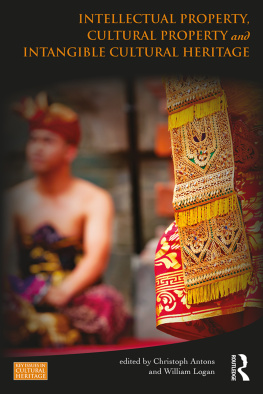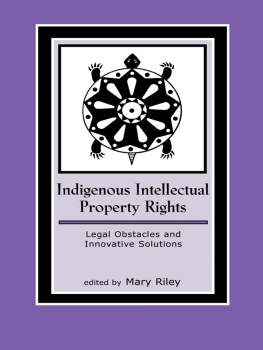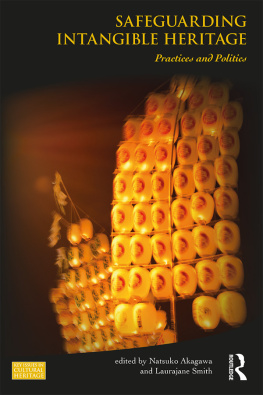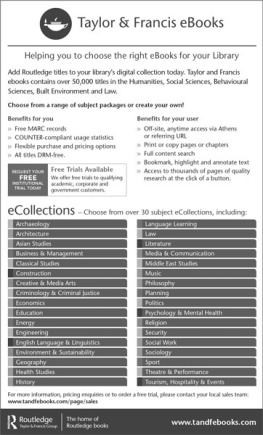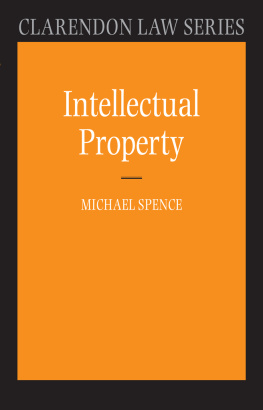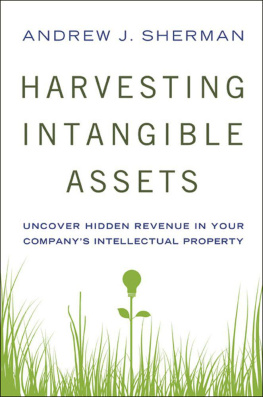Intellectual Property, Cultural Property and Intangible Cultural Heritage
Intellectual Property, Cultural Property and Intangible Cultural Heritage examines various notions of property, in particular cultural property and intellectual property, their relationship to intangible cultural heritage and how these notions of property are employed in rights discourses by governments and indigenous and local communities around the world.
There is a strong historical dimension to the books exploration of the interconnection between intellectual and cultural property, intangible cultural heritage and indigenous rights discourses. UNESCO conventions, discussions in the World Intellectual Property Organization (WIPO), the Convention on Biological Diversity and the recent emphasis on intangible cultural heritage have provided various discourses and models. The volume explores these developments, as well as recent cases of conflicts and cross-border disputes about heritage. Case studies from Asia, as well as from Europe and Australia, examine the key issues surrounding the complex relationship between intellectual and cultural property and intangible cultural heritage.
Intellectual Property, Cultural Property and Intangible Cultural Heritage will be essential reading for scholars and students engaged in the study of heritage, history, law, anthropology and cultural studies.
Christoph Antons
University of Newcastle, New South Wales, Australia
Christoph Antons is Professor of Law at the Newcastle Law School, Faculty of Business and Law, University of Newcastle, Australia. He is an Affiliated Research Fellow at the Max Planck Institute for Innovation and Competition in Munich and Senior Fellow at the Center for Development Research, University of Bonn, Germany. His latest book publication is The Routledge Handbook of Asian Law (2017).
William Logan
Deakin University, Geelong, Australia
William Logan is Professor Emeritus at Deakin University and fellow of the Academy of Social Sciences in Australia. He was formerly UNESCO Chair of Heritage and Urbanism at Deakin, member of the Heritage Council of Victoria and president of Australia ICOMOS. He is co-editor of the Routledge Key Issues in Cultural Heritage book series and the Blackwell Companion to Heritage Studies.
Key Issues in Cultural Heritage
Series Editors:
William Logan and Laurajane Smith
For more information on the series, please visit www.routledge.com/Key-Issues-in-Cultural-Heritage/book-series/KICH
Cultural Diversity, Heritage and Human Rights
Michele Langfield, William Logan and Mirad Nic Craith
Heritage, Labour and the Working Classes
Laurajane Smith, Paul Shackel and Gary Campbell
The Heritage of War
Martin Gegner and Bart Ziino
Managing Cultural Landscapes
Ken Taylor and Jane L. Lennon
Children, Childhood and Cultural Heritage
Kate Darian-Smith and Carla Pacoe
Heritage and Tourism
Russell Staiff, Robyn Bushell and Steve Watson
The Future of Heritage as Climates Change
David Harvey and Jim Perry
Urban Heritage, Development and Sustainability
Sophia Labadi and William Logan
Managing Heritage in Africa
Webber Ndoro, Shadreck Chirikure and Janette Deacon
Intellectual Property, Cultural Property and Intangible Cultural Heritage
Christoph Antons and William Logan
Emotion, Affective Practices, and the Past in the Present
Laurajane Smith, Margaret Wetherell and Gary Campbell
Intellectual Property, Cultural Property and Intangible Cultural Heritage
Edited by Christoph Antons and William Logan

First published 2018
by Routledge
2 Park Square, Milton Park, Abingdon, Oxon OX14 4RN
and by Routledge
711 Third Avenue, New York, NY 10017
Routledge is an imprint of the Taylor & Francis Group, an informa business
2018 selection and editorial matter, Chistoph Antons and William Logan; individual chapters, the contributors
The right of Christoph Antons and William Logan to be identified as the authors of the editorial material, and of the authors for their individual chapters, has been asserted in accordance with sections 77 and 78 of the Copyright, Designs and Patents Act 1988.
All rights reserved. No part of this book may be reprinted or reproduced or utilised in any form or by any electronic, mechanical, or other means, now known or hereafter invented, including photocopying and recording, or in any information storage or retrieval system, without permission in writing from the publishers.
Trademark notice: Product or corporate names may be trademarks or registered trademarks, and are used only for identification and explanation without intent to infringe.
British Library Cataloguing-in-Publication Data
A catalogue record for this book is available from the British Library
Library of Congress Cataloging-in-Publication Data
A catalog record for this book has been requested
ISBN: 978-1-138-79361-3 (hbk)
ISBN: 978-1-138-79362-0 (pbk)
ISBN: 978-1-315-71428-8 (ebk)
Typeset in Times New Roman
by Apex CoVantage, LLC
Contents
CHRISTOPH ANTONS AND WILLIAM LOGAN
Part I
Cultural heritage, cultural property, intellectual property: shifting concepts and terminology
WILLIAM LOGAN
ANA FILIPA VRDOLJAK
CHRISTOPH ANTONS AND LISA ROGERS
DENNIS S. KARJALA AND ROBERT K. PATERSON
MATTHEW RIMMER
Part II
The regulation of heritage and indigenous rights
KATHY BOWREY AND NICOLE GRAHAM
GRO B. WEEN
LEILENE MARIE C. GALLARDO
Part III
Intangible cultural heritage, law and nation building
ALEXANDRA DENES
RAJESWARI KANNIAH
MIRANDA RISANG AYU PALAR
JIANFU CHEN
The interdisciplinary field of heritage studies is now well established in many parts of the world. It differs from earlier scholarly and professional activities that focused narrowly on the architectural or archaeological preservation of monuments and sites. Such activities remain important, especially as modernisation and globalisation lead to new developments that threaten natural environments, archaeological sites, traditional buildings and arts and crafts. But they are subsumed within the new field that sees heritage as a social and political construct encompassing all those places, artefacts and cultural expressions inherited from the past which, because they are seen to reflect and validate our identity as nations, communities, families and even individuals, are worthy of some form of respect and protection.
Heritage results from a selection process, often government initiated and supported by official regulation; it is not the same as history, although this, too, has its own elements of selectivity. Heritage can be used in positive ways to give a sense of community to disparate groups and individuals or to create jobs on the basis of cultural tourism. It can be actively used by governments and communities to foster respect for cultural and social diversity and to challenge prejudice and misrecognition. But it can also be used by governments in less benign ways, to reshape public attitudes in line with undemocratic political agendas or even to rally people against their neighbours in civil and international wars, ethnic cleansing and genocide. In this way there is a real connection between heritage and human rights.

